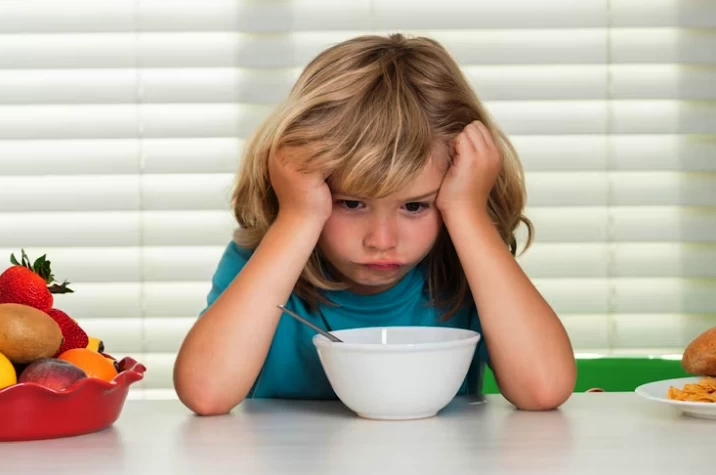
Approach to a Child with Poor Appetite
- Approach to a Child with Poor Appetite
- Problem of Poor Appetite in Children
- Tips to Address Poor Appetite in Children:
- Recommendations for Managing a Child with Poor Appetite:
- Recommended Snack Options:
Problem of Poor Appetite in Children
Parents facing the problem of poor appetite in their children should stop insisting on trying to feed them. One of the biggest mistakes made by families is preparing portions for children as they would for adults. In this case, the family may think, "They'll eat as much as they can, and the rest will remain." However, when a child sees a large portion, they may become stubborn and create problems. It is crucial to prepare an ideal portion for the child and make it visually appealing. Another incorrect behavior that makes the problem of poor appetite persistent in children is comparing them to other children. This erroneous behavior can make the child stubborn and problematic in almost any matter.
Tips to Address Poor Appetite in Children:
- Determine the frequency and quantity of beverages such as milk, soda, fruit juice, tea, and water, and, if necessary, limit the amount of liquid consumed before or during meals.
- Choose foods based on the child's preferences.
- Meal portions should be adjusted according to the child's needs, not the mother's desires. The food should be prepared in a way that children can eat, and the child should be allowed to eat freely when they want. If a food item is rejected during a meal, try offering a different one, and the child should not be forced to eat.
- If a food is rejected, it should be reintroduced to the child at intervals.
- Meal times should be regular, and snacks that could curb the child's appetite or sweets like candy or chocolate should not be given in between. The family members' attitudes toward the child should be consistent.
- Meals should be decorated to attract the child's attention, and the benefits of foods should be explained to the child through games, allowing the child to make choices.
- Avoid using television and tablets to distract the child during meals.
- Eating in a crowded environment or with friends can have a positive impact on the child.
- If there is a deficiency of vitamins and minerals, they should be replaced, and unnecessary vitamin and mineral supplements should be avoided. Particularly, anemia (iron deficiency) levels should be checked, and necessary supplements should be taken based on a doctor's recommendation.
- For children who eat in small amounts, frequent meals should be provided, and if needed, the content of the meals should be enriched (modular nutrition products).
- The person responsible for the child's nutrition and care (mother, caregiver, family member) should be determined, and nutrition education and recommendations should be provided individually.
Children who drink water or consume sugary foods before meals, or have snacks in between meals, may have a reduced appetite. If the child experiences emotional issues during the meal or has engaged in tiring activities like playing ball or jumping rope before eating, they may not want to eat.
If the child has been accustomed to playing games and watching television while being fed, they may not want to eat because they always expect these behaviors. Rewarding the child for eating can lead to resistance in the next meal. Both punishment and reward have the same effect.
It is known that B-group vitamins such as folic acid and minerals like iron have positive effects on appetite.

Recommendations for Managing a Child with Poor Appetite:
- The consumption frequency and quantity of beverages like milk, soda, fruit juices, tea, and water should be determined, and their consumption before meals and during meals should be restricted.
- Foods should be prepared in a way that suits the child's preferences and encourages the child to eat on their own during meals.
- Meal portions should be adjusted according to the child's preferences.
- If a food offered during a meal is rejected by the child, a different food should be tried, and insistence should be avoided. The food should be offered to the child again at regular intervals.
- The child's meal times should be regular, and the child should sit at the table with family members. Sweets (such as candy and chocolate) that could spoil the child's appetite should not be given between meals. Family members should be consistent in this matter.
- The child's plate should be decorated in a way that captures the child's interest, and the child should be allowed to make choices.
- Having the child eat in a crowded environment with other children can have a positive impact on their eating habits.
- For children who eat in small amounts, the number of meals should be increased. If necessary, the meal content can be enriched with modular nutrition products.
Recommended Snack Options:
- A blend of milk, banana, and nuts
- Milk with added cocoa and honey
- Nut and dried fig cake with a glass of milk (you can add molasses to the cake dough)
- Raisins and chickpeas
- Dates
- Freshly squeezed orange juice with a tablespoon of molasses
- A blend of milk, banana, honey, baby biscuits, and almonds
- Dried fruits and freshly squeezed fruit juices
- Peanut butter or cream cheese spread on bread
- Boiled potatoes and buttermilk
- Full-fat honey milk or yogurt (two hours before bedtime)




